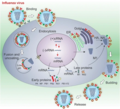File:12035 2012 8320 Fig5 HTML.webp
From Wikimedia Commons, the free media repository
Jump to navigation
Jump to search
12035_2012_8320_Fig5_HTML.webp (520 × 472 pixels, file size: 61 KB, MIME type: image/webp)
File information
Structured data
Captions
Captions
Influenza A viruses life cycle
Summary
[edit]| Description12035 2012 8320 Fig5 HTML.webp |
English: Influenza A viruses are enveloped, negative strand RNA viruses belonging to the Orthomyxoviridae family. Their genome consists of eight single-stranded RNA segments encoding 11 or 12 proteins: the receptor-binding haemagglutinin (HA); the sialic acid-destroying enzyme neuraminidase (NA), the ion channel M2, the matrix protein M1; the nucleoprotein (NP); the polymerase acidic protein (PA), polymerase basic proteins 1 and 2 (PB1, PB2) and the pro-apoptotic protein polymerase basic 1 (PB1)-F2; the nuclear export protein (NEP; also known as NS2) and the host antiviral response antagonist non-structural protein 1 (NS1); the newly identified N40 protein, which is expressed from the PB1 segment and has an unknown function [77]. Within the virion, each of the eight RNA segments forms a viral ribonucleoprotein (RNP) complex: in particular, viral RNA is wrapped around NP, and this structure is in turn bound to the viral polymerase complex, to constitute the viral nucleocapsid. In the initial stages of influenza A virus replication, the viral HA binds to host cell receptors that contain terminal α-2,6-linked or α-2,3-linked sialic acid (α-2,6-SA or α-2,3-SA) moieties, and the virus enters the cell by receptor-mediated endocytosis. Cleavage of HA by cellular proteases is required to expose the HA peptide that is responsible for the fusion between the viral envelope and the endosomal membrane. Acidification of the late endocytic vesicles allows the viral HA to undergo a conformational rearrangement that produces a fusogenic protein. The H+ ions in the acidic endosome are pumped, via the viral M2 ion channel, into the virus structure allowing the virus uncoating and the release of RNP complexes into the cytoplasm. The viral RNA is then imported in an ATP-dependent manner into the cell nucleus for transcription of genomic and messenger RNAs which are transported to the cytosol for translation. Viral HA, NA and M2 are synthesized in the Endoplasmic Reticulum, transported by the trans-Golgi secretory pathway and the mature proteins are inserted in the plasma membrane. New viral RNA is encased in the nucleocapsidic proteins and, together with matrix protein, is transported to cell surface where HA and NA will be incorporated. Progeny virions are then released from cells by budding. |
| Date | |
| Source | https://link.springer.com/article/10.1007%2Fs12035-012-8320-7 |
| Author | Giovanna De Chiara, Maria Elena Marcocci, Rossella Sgarbanti, Livia Civitelli, Cristian Ripoli, Roberto Piacentini, Enrico Garaci, Claudio Grassi, Anna Teresa Palamara |
Licensing
[edit]This file is licensed under the Creative Commons Attribution 2.5 Generic license.
- You are free:
- to share – to copy, distribute and transmit the work
- to remix – to adapt the work
- Under the following conditions:
- attribution – You must give appropriate credit, provide a link to the license, and indicate if changes were made. You may do so in any reasonable manner, but not in any way that suggests the licensor endorses you or your use.
File history
Click on a date/time to view the file as it appeared at that time.
| Date/Time | Thumbnail | Dimensions | User | Comment | |
|---|---|---|---|---|---|
| current | 09:29, 25 September 2020 |  | 520 × 472 (61 KB) | Guest2625 (talk | contribs) | Uploaded a work by Giovanna De Chiara, Maria Elena Marcocci, Rossella Sgarbanti, Livia Civitelli, Cristian Ripoli, Roberto Piacentini, Enrico Garaci, Claudio Grassi, Anna Teresa Palamara from https://link.springer.com/article/10.1007%2Fs12035-012-8320-7 with UploadWizard |
You cannot overwrite this file.
File usage on Commons
The following page uses this file:
Structured data
Items portrayed in this file
depicts
17 August 2012
image/webp
1b414c1c703282aba6f3628c690c2ed643378d10
62,916 byte
472 pixel
520 pixel
Hidden category:
